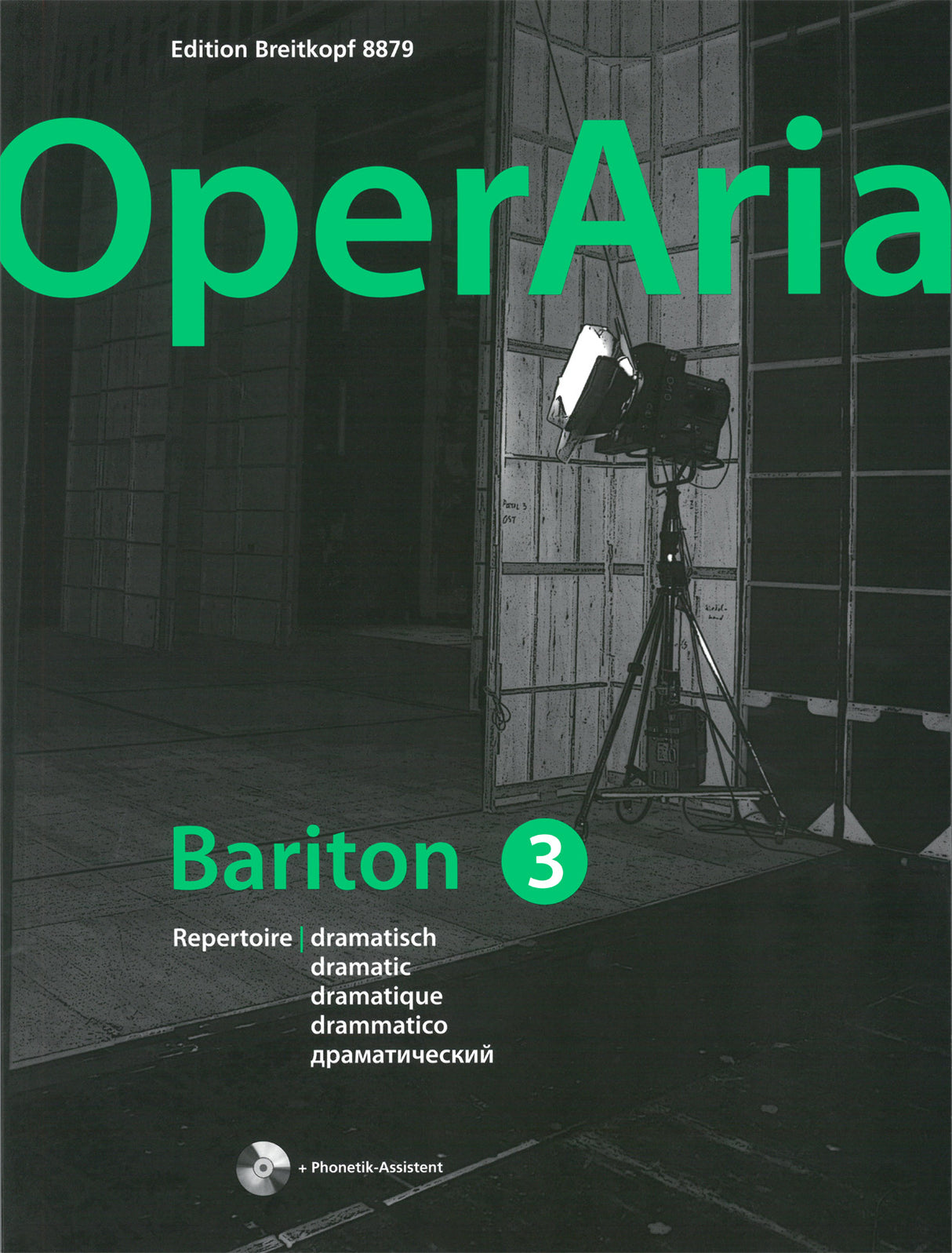OperAria Baritone - Volume 3
Dramatic
In stock and typically ships within 1 business day.
- Composers: Camille Saint-Saëns (1835-1921), Heinrich Marschner (1795-1861), Ruggero Leoncavallo (1857-1919), Giuseppe Verdi (1813-1901), Alexander Borodin (1833-1887), Anton Rubinstein (1829-1894), Ludwig van Beethoven (1770-1827), Richard Wagner (1813-1883), Paul Hindemith (1895-1963), Gioachino Rossini (1792-1862), Pietro Mascagni (1863-1945), Francesco Cilea (1866-1950), Carl Maria von Weber (1786-1826), Giacomo Puccini (1858-1924), Alban Berg (1885-1935), Nikolai Rimsky-Korsakov (1844-1908)
- Editor: Peter Anton Ling
- Format: Vocal Score / CD
- Instrumentation (this edition): Piano Reduction, Baritone
- Originally for: Opera
- Work Languages: French, German, Italian, Russian
- ISMN:
- Size: 9.1 x 12.0 inches
- Pages: 160
Listen on Soundcloud
Description
"OperAria is a stroke of luck, the most up-to-date and complete material you need to be able to follow your dream profession as singer!" (Roman Trekel, Patron Baritone)
"It is my aim to give students a modern, systematically structured, well-informed vocal coach that meets the demands of present-day stage practice. And, of course, a cohesive repertoire and logical presentation of audition arias for every vocal genre." (Peter Anton Ling)
OperAria is the ideal "vocal coach" for all voice types. Edited by Peter Anton Ling, the books address all singers and are conceived above all for training and auditions. in addition, through their careful selection, they offer valuable inspiration for opera recitals.
Repertoire anthology of opera arias according to vocal criteria (range, tessitura, specifics, type of aria) with due regard to practical aspects of musical and theatrical nature (style, era, role type, national provenance) with comments on the arias
Works:
- Beethoven: Ha, welch ein Augenblick from Fidelio, Op. 72
- Weber: Schweig, damit dich niemand warnt! from Der Freischütz, J. 277, Op. 77
- Weber: Wo berg’ ich mich? / Schweigt, glüh’nden Sehnens w from Euryanthe, J. 291, Op. 81
- Marschner: An jenem Tag from Hans Heiling, Op. 80
- Wagner: Die Frist ist um from Der fliegende Holländer (The Flying Dutchman), WWV 63
- Wagner: Abendlich strahlt der Sonne Auge from Das Rheingold, WWV 86a
- Wagner: Leb’ wohl, du kühnes, herrliches Kind from Die Walküre, WWV 86B
- Wagner: Der Augen leuchtendes Paar from Die Walküre, WWV 86B
- Wagner: Wie duftet doch der Flieder from Die Meistersinger von Nürnberg, WWV 96
- Wagner: Wahn! Wahn! Überall Wahn! from Die Meistersinger von Nürnberg, WWV 96
- Wagner: Wehvolles Erbe from Parsifal, WWV 111
- Wagner: Mein Vater! Hochgesegneter der Helden! from Parsifal, WWV 111
- Verdi: Perfidi! / Pietà, rispetto, amore from Macbeth
- Verdi: Pari siamo! from Rigoletto
- Verdi: Ah, ella è qui dunque! / Cortigiani, vil razza dan from Rigoletto
- Rossini: Vanne; la tua meta già vedo / Credo in un Dio crud from Otello
- Rubinstein: Ne plač’ ditja from Der Dämon
- Borodin: Ni sna, ni otdycha from Prince Igor
- Saint-Saëns: Maudite à jamais soit la race from Samson and Delilah, Op. 47
- Rimsky-Korsakov: Gluchaja noč’ from Kashchey the Deathless
- Puccini: Tre sbirri ... una carrozza from Tosca
- Leoncavallo: Si può? Signore! Signori! from Pagliacci
- Mascagni: Il cavallo scalpita from Cavalleria Rusticana
- Cilea: Ecco il monologo from Adriana Lecouvreur
- Berg: Wir arme Leut! from Wozzeck, Op. 7
- Hindemith: Wagen wollen from Mathis der Maler (1935)
Publishers use a lot of words to describe what they sell, and we know it can be confusing. We've tried to be as clear as possible to make sure you get exactly what you are looking for. Below are descriptions of the terms that we use to describe the various formats that music often comes in.
Choral Score
A score for vocalists that only contains the vocal lines. The instrumental parts are not there for reference. Generally, cheaper than a vocal score and requires multiple copies for purchase.
Facsimile
Reproductions of the original hand-written scores from the composer.
Full Score
For ensemble music, this indicates that the edition contains all parts on a single system (there are not separate parts for each player). In larger ensembles, this is for the conductor.
Hardcover
Hardbound. Generally either linen-covered or half-leather.
Orchestral Parts
Similar to a wind set, this is a collection of parts. In the case of strings, the numbers listed are the number of copies included, though generally these are available individually (often with minimum quantities required).
Paperback
When publishers offer multiple bindings (e.g. hardcover) or study scores, this is the "standard" version. If you're planning to play the music, this is probably what you want.
Performance / Playing Score
A score of the music containing all parts on one system, intended for players to share. There are not separate parts for each player.
Set of Parts
For ensemble music, this indicates that there are separate individual parts for each player.
Solo Part with Piano Reduction
For solo pieces with orchestra, this is a version that contains a piano reduction of the orchestra parts. For piano pieces, two copies are typically needed for performance.
Study Score
A small (think choral size) copy of the complete score meant for studying, and not playing. They make great add-ons when learning concertos and small chamber works.
Vocal Score
A score prepared for vocalists that includes the piano/organ part or a reduction of the instrumental parts.
Wind Set
For orchestral music, this is a collection of wind and percussion parts. The specific quantities of each instrument are notated.
With Audio
In addition to the printed music, the edition contains recordings of the pieces. This may be an included CD, or access to files on the internet.
With / Without Fingering (Markings)
Some publishers prepare two copies - a pure Urtext edition that includes no fingering (or bowing) suggestions and a lightly edited version that includes a minimal number of editorial markings.



